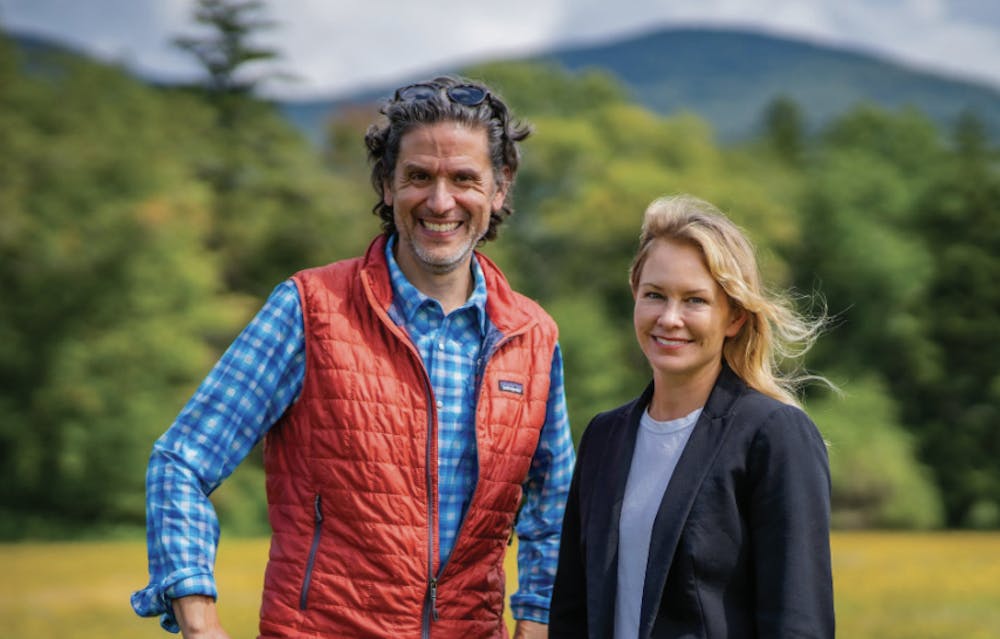Vermont has recently faced unusual and severe weather events, from a late-May frost that significantly reduced the crops of commercial apple orchards to the record rainfall and flooding in July and August that caused significant damage locally, which have challenged the established sentiment of the state as a “climate haven.” In the face of these challenges, Megan Mayhew-Bergman, assistant professor of English and director of the Bread Loaf Environmental Writers’ conference, has founded a new company to help companies fight the climate crisis.
In September, while on sabbatical, Mayhew-Bergman co-founded GreenStory Collective, an environmental storytelling agency, with Mike Farber, a former lawyer and communications executive with experience in several sectors from technology to NGOs. Mayhew-Bergman and Farber’s new venture plans to partner with companies, nonprofits and other organizations taking on the climate crisis, in order to help them use language and stories to better communicate their mission to the public.
One of the biggest challenges nonprofits and companies face in trying to combat climate change is storytelling, according to Mayhew-Bergman. GreenStory Collective’s goal is to help the scientists, inventors and lawyers in the climate space present their complex work in a clear, accessible way, while honoring the complexity of climate issues.
“It’s like teaching someone how to write a Beatles pop song,” Mayhew-Bergman said. “How do you get to the clearest, most effective, most universal language where values and passion come through?”
Co-founders Mayhew-Bergman and Farber designed GreenStory to create StoryKits, a set of narratives based on research and interviews that can serve as the basis for clients’ marketing and media content. They hope to support organizations working on climate-related campaigns through securing funding or educating the public. While she was unable to discuss the specific clients with whom they have begun work, Mayhew-Bergman was enthusiastic about GreenStory’s ventures in green tech, robotics, alternative energy and large conservation organizations.
Mayhew-Bergman emphasized that the work she and Farber are attempting to do is not greenwashing, a term coined in the 1980s that describes how companies tout false claims about their commitment to combating climate change in an effort to hide other ventures they are pursuing that fundamentally hurt the planet. Rather, GreenStory’s work is focused on consulting for scientists, nonprofits and other organizations to illustrate how companies and organizations can communicate better. Mayhew-Bergman said she is enthusiastic about being a thought leader in the field, and ethically opening doors for people dedicated to fighting climate change.
Inclusivity is a large part of GreenStory’s mission. Inspired by an interview for a Guardian story in 2019 she did with Heather McTeer Toney, a former EPA administrator and the first Black mayor of Greenville, Miss., Mayhew-Bergman wants to go beyond Big Green, the large environmental agencies in cities that are difficult for everyday people to join. She aims to highlight emerging companies, as well as non-traditional entrepreneurs, women and people from marginalized backgrounds jumping into the climate space.
“My objective is to widen people’s understanding and passion for the good, clean work that’s going on in the world, and make space for innovation,” Mayhew-Bergman said. “I want to celebrate people who are out there trying to solve [the climate crisis].”
The inspiration for GreenStory comes from a variety of projects Mayhew-Bergman has undertaken in the past. In addition to being the author of books such as “How Strange a Season” and a professor of creative writing, Mayhew-Bergman draws upon her experience working as a climate reporter, mainly for The Guardian, as well as the nonprofit she founded called Open Field. She does similar work at Open Field and is willing to share her efforts, pro bono, to help schools, communities, lawyers and any other organizations open to learning more about fighting the climate crisis. Mayhew-Bergman urged more people to step into the conversation and learn what it means to be an environmental communicator.
GreenStory’s philosophies also stem from her work with the Conservation Law Foundation, a New England-based environmental advocacy organization where she was a senior fellow from 2019 to 2023. Mayhew-Bergman did similar work with that foundation, teaching op-ed workshops and climate communication and partnering with schools and independent bookstores in Vermont.
Mayhew-Bergman noted that the climate communication practices she tries to teach avoid heavily self-righteous language and honors the complexity of climate issues. “Drop us away from the polarized, polemical, ‘exclamation point’ manifestos, and drop us into something that is specific and heartfelt and open, and honors why this is difficult,” she explained.
Gage Schrier ’24.5, a student of Mayhew-Bergman, enjoyed learning to write about difficult subject matter in her class. “Her accessible explanations of largely inaccessible topics renders her specific style of advice, or teaching, as integral to many Middlebury creative writing majors' development,” Schrier told The Campus.
Mayhew-Bergman noted that she enjoys her dual roles as a practitioner of storytelling and a professor teaching it, adding that her work for GreenStory and other ventures has helped her better teach her students. In a reality where humanities and literature departments are under threat, Mayhew-Bergman encourages her Middlebury students not to lose hope for the power of storytelling.
“I believe that the humanities are employable,” Mayhew-Bergman said. “Our vocation as storytellers is about human connection, processing justice, injustice, beauty, better decision making.”

Tejas Srinivasan '24 (he/him) is an Editor at Large.
Originally from Cincinnati, Ohio, Tejas previously served as an opinion editor. He spent his junior year in London at King’s College. Outside of The Campus, he also hosts a podcast called Cultural Mixtapes which he started in the summer of 2022. Tejas is an English Major, on the literature track, with a music minor.




